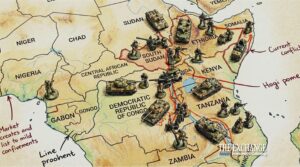- The Washington Accords and Rwanda DRC Peace Deal
- Binance Junior, a crypto savings account targeting children and teens debuts in Africa
- African Union Agenda 2063 and the Conflicts Threatening “The Africa We Want”
- New HIV prevention drug is out — can ravaged African nations afford to miss it?
- From banking to supply chains, here’s how blockchain is powering lives across Africa
- Modern railways system sparks fresh drive in Tanzania’s economic ambitions
- Viktoria Ventures honoured for advancing angel investing across Africa
- FSD Africa rolls out $30 million venture fund to speed up insurtech innovation
Author: Kester Kenn Klomegah
Kester Kenn Klomegah is an independent research writer and a policy consultant on African affairs in the Russian Federation and Eurasian Union. He has won media awards for highlighting economic diplomacy in the region with Africa. Currently, Klomegah is a board member of the Regional Council on Development of Relations with Africa, an economic and trade policy organization created by the Russian Chamber of Commerce and Industry (Moscow Region). As a contributor to The Exchange, he writes on issues related to political and economic relations on Russia, Africa and BRICS.
The Presidential Council for Africa (PCA), founded by President Emmanuel Macron in 2017, is driving this project. Its coordinator, Wilfrid Lauriano do Rego, told RFI that each student’s case will be examined separately.
“Each student presents a different case depending on whether they would like to continue studying in France or not and whether French universities can take them. And we also need to liaise with the French authorities to make this project feasible,” he said.
The initiative is not limited to francophone students but is open to anglophone students too, depending on how fluent they are in French. The project concerns all university courses but may be limited to what is on offer within the French universities participating in this initiative.
“It will also depend on what kind, of course, they are following and the decisions of the French universities giving these courses on the matter,” he said.
Three hundred African students have, so far, enrolled in the PCA’s initiative. Lauriano do Rego said that he doesn’t know, at present, if they can accommodate more students as it depends on the student’s achievements.
“Both Angola and Mozambique have a very limited level of trade with Russia and Ukraine; Angola imports wheat and yeast from Russia, while Mozambique imports a significant amount of wheat and a small amount of refined oil from Russia,” Oxford Economics Africa analyst who follows these two African economies told Mozambique News Agency.
“It appears that, at least for now, Angola is generally benefiting from higher oil and gas prices, which are partially driven by the conflict,” Gerrit van Rooyen said in remarks from Paarl, South Africa. Higher oil prices are positive for government revenues,” the analyst added. If the rise is sustained, “this could increase investment in Angola and lower debt levels faster than previously anticipated.”
“If gas prices remain high due to the conflict, this will be positive for investments in Mozambique’s liquefied natural gas [LNG],” his analysis continues, since “the profits from the natural gas in the Rovuma basin could be greater than the risk of armed extremist insurgency in the region.”
While Russia’s preferred visions and modes of action in the Maghreb seem to be fairly well identified, the perceptions and expectations, but also the possible reservations on the Maghreb are more rarely expressed by the leaders of these countries and little-studied at the academic level.
Perhaps we should look at this, as far as the powers that be are concerned, a concern for discretion regarding the sensitive aspects of this foreign policy component – this is particularly true for Algeria – an area on which they generally communicate little and for the academic research community in North Africa, a lack of knowledge related to the history, geography and culture of contemporary Russia.
If there is undoubtedly, on the Maghreb side and with important nuances from one country to another, a manifest interest in a development or a deepening of the partnership with Moscow, questions may remain about Russia’s objectives, especially in Rabat and Tunis.
In practical reality, it aims at creating a continental market for goods and services, with free movement of businesspeople and investments in Africa.
Several reports indicate that the summit strives to bring Africa and Europe closer together through strengthening economic cooperation and promoting sustainable development, with both continents co-existing in peace, security, democracy, prosperity, solidarity and human dignity.
It is against this backdrop that the two partners are determined to work together on a strategic, long-term footing to develop a shared vision for EU-Africa relations in a globalized world.
Apart from the absence of a public strategy for the continent, there is a lack of coordination among various state and para-state institutions working with Africa.
Despite the growth of external players’ influence and presence in Africa, Russia has to intensify and redefine its parameters. Russia’s foreign policy strategy regarding Africa has to spell out and incorporate the development needs of African countries.
Unlike most competitors, Russia has to promote an understandable agenda for Africa: working more on sovereignty, continental integration, infrastructure development, human development (education and medicine), security (including the fight against hunger and epidemics), normal universal human values, the idea that people should live with dignity and feel protected.
The Maputo daily Noticias wrote after the SADC summit that a budgetary allocation of US$29.5 million has been set aside for the three-month extension, after high-level consultations and this would mean until at least mid-April.
The SAMIM extension set from mid-January.
Addressing the opening session of the summit, the current SADC Chairperson, Malawian President Lazarus Chakwera, urged regional bloc member states to stick together and ensure that SAMIM remains multidimensional and comprehensive.
An additional advantage is that African government representatives and heads of many international organizations work in this city.
South Africa and Egypt, as possible alternatives, were thoroughly discussed as South Africa and Russia are members of BRICS, and Egypt has excellent post-Soviet relations.
Reminding that the first summit held in Sochi was co-chaired by President Vladimir Putin and Egyptian President Abdel Fattah el-Sisi, who also rotationally during that year headed the African Union.
The large-scale Russia-Africa summit, held in Sochi in October 2019, and described as the first of its kind in the history of Moscow’s relations with Africa, attracted more than 40 African presidents, as well as the heads of major regional associations and organizations.
Senegal is looking towards learning from the mistakes of other African countries in an attempt to reverse the so-called “resource curse” that plagues many oil and gas producing African countries. In a further demonstration of enlisting public opinion, such a broad meeting was called to brain-storm for ideas and incorporate into a national development programme.
“It is extremely import to remind you all today, we remain convinced that the promotion of a participatory, multi-institutional, and collaborative approach is imperative for capable governance and guaranteeing sustainable prosperity,” stated President Macky Sall of the Republic of Senegal.
Under this new legislation, the citizens of Senegal will have a seat at the table, with civil society to play a leading role in driving the discussion surrounding the monetization of the country’s oil and gas industry. This landmark act will ensure a trickle-down economy that guarantees investments within petrochemicals, agriculture, power, gas, and transportation, thus expanding the economy and facilitating the creation of many jobs for Senegalese citizens.
China actively honours its commitment to making vaccines a global public good. At the time when Chinese vaccines had just reached the market and domestic supply was tight, China began to supply vaccines to Africa in support of its battle against the pandemic.
By November 2021, China had provided over 1.7 billion doses of Covid-19 vaccine to more than 110 countries and organizations, including 50 African countries and the AU Commission, and is striving to provide an aggregate total of two billion doses by the end of 2021.
In addition, it donated US$100 million to COVAX, which aims at ensuring all countries have access to a safe, effective vaccine.
By 2022, France plans to reduce and move its troops and will be restricted to regions that are not strategic for combating terrorism, which indicates that they will probably only act in the security of specific points, such as diplomatic and international organizations facilities.
That ends the so-called “Operation Barkhane”, which was a military mission marked by a tactic of permanent occupation of the Sahel countries by French troops.
The French government, however, apparently will try to reorganize its strategy in Africa. It seems that the focus of action will turn to the Gulf of Guinea.




